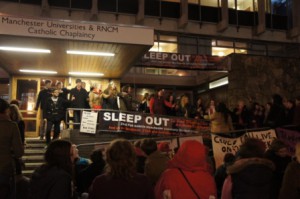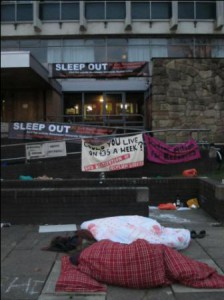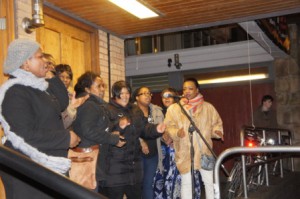Campaigners sleep out on the street to highlight destitution
Article published: Friday, March 2nd 2012
Campaigners and charities came together to sleep out on the street last week in protest against the enforced destitution of refused asylum seekers.
 The event formed part of the national Still Human Still Here campaign, a coalition of over 30 organisations who argue the asylum system, found by a Parliamentary committee in 2007 to be practising a “deliberate policy of destitution” under the last Labour government, is inhuman and ineffective. 120 people attended the event, with 42 sleeping out through the night.
The event formed part of the national Still Human Still Here campaign, a coalition of over 30 organisations who argue the asylum system, found by a Parliamentary committee in 2007 to be practising a “deliberate policy of destitution” under the last Labour government, is inhuman and ineffective. 120 people attended the event, with 42 sleeping out through the night.
Amnesty International Student Society, Student Action for Refugees (STAR), refugee homelessness charity The Boaz Trust and Women Asylum Seekers Together (WAST), were among the organisations represented in the sleepout on the steps of the University of Manchester’s student union.
The students and campaign supporters slept out to highlight the struggle of those left destitute. Two students who took part say they will now live on £35 for a week, the weekly sum for asylum seekers on ‘Section 4’ support, an allowance intended to provide short-term support for refused asylum seekers which must be spent as vouchers at designated supermarkets.
Access to this support is in practice restricted, with support typically cut 21 days following refusal, and often subject to “specific strict requirements” according to a recent Children’s Society report on destitution among asylum seeking families. Asylum seekers are not permitted to work, and those left without support depend upon charity.
 2,000 asylum seekers are estimated to be destitute in Manchester alone, according to Boaz Trust director David Smith.
2,000 asylum seekers are estimated to be destitute in Manchester alone, according to Boaz Trust director David Smith.
Such Section 4 support for refused asylum seekers as exists offers a limited safety net, with the Children’s Society report pointing out how “for most families, accessing this support means being forced to start making arrangements to return to their country of origin where they may still fear for their and their children’s safety and so many choose not to apply at all.”
Isabelle Uren, a member of STAR, said “after working with destitute asylum seekers it’s good to see so many students supporting these issues”.
Sofia, a member of WAST, spoke to the crowds: “Before we came here we were somebody. I was Sofia, now I am Sofia, destitute.” She spoke of the emotional strain of being in such an unstable situation and how women can often suffer the most through forced prostitution and unwanted pregnancies. She finished by explaining the injustices and disempowering elements of the asylum system and how it can affect those subject to it, saying “it is not the fault of the person, it is the system”.
In his speech Boaz Trust director David Smith argued that initial UK Border Agency interrogations, used to assess asylum claims, may not reveal the full facts of a case as often women may have suffered acts of gendered violence such as rape, common as a weapon of war in some countries, which they would not wish to immediately disclose. Smith claimed that if such facts subsequently come out at appeal, the Home Office may say they have been fabricated because of a refused claim.
He also highlighted the misrepresentation of asylum seekers and myths surrounding their experiences, arguing that “the stuff you read in most papers simply isn’t true”. Smith specifically discussed the common misconception that the UK accepts a quarter of the world’s asylum seekers, pointing out how the true figure is just 3 per cent.
Smith emphasised the importance of campaigning and raising awareness about the reality of destitution: “The only way we will make change is everybody finding out the truth. You won’t find this in the Daily Mail”.
He also explained how many asylum seekers who do take up ‘Assisted Voluntary Return’ do so after living in destitution. Smith finished by claiming that politicians often fail to tackle such a divisive issue unlikely to win them votes, saying “the reality is that the problem is a political one. We need to change the asylum system.”
Katy Tolman
For more information and to find out how to get involved check out the StillHumanStillHere campaign
More: Manchester, Migration and asylum, News
Comments
No comments found
The comments are closed.




